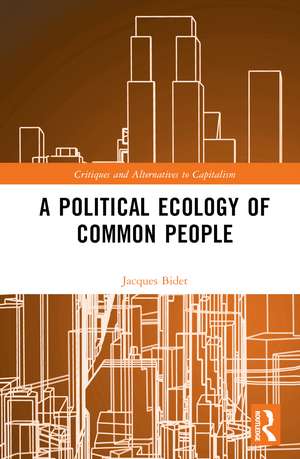A Political Ecology of Common People: Critiques and Alternatives to Capitalism
Autor Jacques Bideten Limba Engleză Hardback – 26 oct 2023
The approach is inspired by Marx’s theory, as revisited through Bourdieu and Foucault, Rawls and Habermas, and Ostrom and Wallerstein. Based on a new concept, that of “metastructure” which defines the relationship between the structural and the symbolic, it confronts contemporary debates on class, gender andcoloniality, as well as on the state, the nation and the World-System.
Global social-ecological destruction is thus analysed on three registers: that of capital, which produces for profit; that of (supposed) competent authority, which produces to produce; and that of the nation, which produces to conquer. Consumerism follows from productivism, not the other way around. The question of need takes precedence over that of desire.
This metastructural configuration poses the imperative constantly renewed to counter the blind logic of capital with a rational logic of organisation, and, at the same time, to counter the logic of the organisers through a democratic discursive logic. This latter is the recourse of common people. The Global South is on the front line of this struggle; and women’s struggle bears its own decisive ecological impulse.
Din seria Critiques and Alternatives to Capitalism
-
 Preț: 286.84 lei
Preț: 286.84 lei -
 Preț: 382.42 lei
Preț: 382.42 lei -
 Preț: 309.20 lei
Preț: 309.20 lei -
 Preț: 287.08 lei
Preț: 287.08 lei - 17%
 Preț: 257.55 lei
Preț: 257.55 lei - 16%
 Preț: 262.68 lei
Preț: 262.68 lei - 18%
 Preț: 983.41 lei
Preț: 983.41 lei - 18%
 Preț: 982.93 lei
Preț: 982.93 lei - 18%
 Preț: 1042.91 lei
Preț: 1042.91 lei -
 Preț: 384.52 lei
Preț: 384.52 lei - 18%
 Preț: 1042.00 lei
Preț: 1042.00 lei - 18%
 Preț: 980.00 lei
Preț: 980.00 lei - 26%
 Preț: 764.56 lei
Preț: 764.56 lei - 26%
 Preț: 766.20 lei
Preț: 766.20 lei - 26%
 Preț: 736.63 lei
Preț: 736.63 lei - 26%
 Preț: 765.66 lei
Preț: 765.66 lei - 26%
 Preț: 736.13 lei
Preț: 736.13 lei
Preț: 982.01 lei
Preț vechi: 1197.58 lei
-18% Nou
Puncte Express: 1473
Preț estimativ în valută:
187.94€ • 195.22$ • 156.11£
187.94€ • 195.22$ • 156.11£
Carte tipărită la comandă
Livrare economică 03-17 februarie 25
Preluare comenzi: 021 569.72.76
Specificații
ISBN-13: 9781032512884
ISBN-10: 1032512881
Pagini: 192
Dimensiuni: 156 x 234 x 13 mm
Greutate: 0.51 kg
Ediția:1
Editura: Taylor & Francis
Colecția Routledge
Seria Critiques and Alternatives to Capitalism
Locul publicării:Oxford, United Kingdom
ISBN-10: 1032512881
Pagini: 192
Dimensiuni: 156 x 234 x 13 mm
Greutate: 0.51 kg
Ediția:1
Editura: Taylor & Francis
Colecția Routledge
Seria Critiques and Alternatives to Capitalism
Locul publicării:Oxford, United Kingdom
Public țintă
PostgraduateCuprins
Introduction: What is to be done in the age of disaster?
Preamble: the "metastructural turn"
Part I: Capitalism and the State, the World-System and the Class World-State
1. The Modern Ecological Class Structure
1.1. Capital as a social-ecological fact
1.2. Competence as a social-ecological fact
1.3. The "fundamental" or "popular" class: the class of the "common people"
2. Class Violence and National Violence
2.1. The nation-state and its regimes of hegemony
2.2. From the Nation to the System of Nations
2.3. The political intertwining of class-colony/gender
3. World-System, World-State, World-Nation
3.1. The Nation-State within the World-System
3.2. Beyond the World-System: the World-State
3.3. Towards the World-Nation?
Part II: Citizens of a World-Nation, Residents of the Planet
4. Social Domination Alone Is Destroying the Planet
4.1. The order of battle
4.2. Unthought aspects of productivism and consumerism
4.3. On the right and proper use of the planet
5. Only Struggles for Liberation Can Protect the Planet
5.1. Class struggles as ecological struggles
5.2. Gender and Global-South struggles as ecological struggles
6. The World-Nation, the Ultimate Ecological Community
6.1. The nation as the ultimate figure of the common
6.2. Humanity, the ultimate nation
6.3. A national politics for humanity
6.4. Epilogue: a community of the living?
Preamble: the "metastructural turn"
Part I: Capitalism and the State, the World-System and the Class World-State
1. The Modern Ecological Class Structure
1.1. Capital as a social-ecological fact
1.2. Competence as a social-ecological fact
1.3. The "fundamental" or "popular" class: the class of the "common people"
2. Class Violence and National Violence
2.1. The nation-state and its regimes of hegemony
2.2. From the Nation to the System of Nations
2.3. The political intertwining of class-colony/gender
3. World-System, World-State, World-Nation
3.1. The Nation-State within the World-System
3.2. Beyond the World-System: the World-State
3.3. Towards the World-Nation?
Part II: Citizens of a World-Nation, Residents of the Planet
4. Social Domination Alone Is Destroying the Planet
4.1. The order of battle
4.2. Unthought aspects of productivism and consumerism
4.3. On the right and proper use of the planet
5. Only Struggles for Liberation Can Protect the Planet
5.1. Class struggles as ecological struggles
5.2. Gender and Global-South struggles as ecological struggles
6. The World-Nation, the Ultimate Ecological Community
6.1. The nation as the ultimate figure of the common
6.2. Humanity, the ultimate nation
6.3. A national politics for humanity
6.4. Epilogue: a community of the living?
Notă biografică
Jacques Bidet is a former professor at the University of Paris-Nanterre, France, and the founder of the journal Actuel Marx. Throughout his research since the 1980s, he has been developing a theory of modern society and history known as a “metastructural theory of modernity”, mainly inspired by Marx, in the light of both Althusser and Habermas.
Descriere
Advancing the concept of the ‘metastructure’ to define the relationship between the structural and the symbolic, this book argues that the global ecological crisis has resulted exclusively from processes of social domination, from which it follows that ecological struggle and social struggle are one and the same thing.
